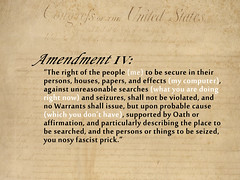This case involves a search of a vehicle. In US v. Taylor, --- F.3d ----, 2011 WL 561979 (C.A.8 (Mo.)) Officer Gillespie and her partner responded to a request by a fellow officer to follow a truck and initiate a traffic stop if the driver, who officers later identified as Taylor, committed a traffic violation. Officer Gillespie was informed that Taylor was suspected of involvement in a narcotics transaction and that the narcotics were believed to be in his vehicle. Officer Gillespie observed Taylor fail to signal before changing lanes, and she initiated a traffic stop. When Taylor could not produce a valid insurance card, she arrested him and took him into custody.
Police towing policy dictated that when an individual is arrested for a traffic violation, the officer should give the individual the option to release the vehicle to another driver, allow the vehicle to be left at the scene, or drive the vehicle to the police station. Officer Gillespie did not provide Taylor with these options, however, because of another KCPD policy requiring the impoundment of a vehicle “when the vehicle is known or believed to have been used in the commission of a crime and has evidentiary value.” Based on this policy, Officer Gillespie decided to tow and search the vehicle.
Regardless of under what portion of the policy an impoundment occurs, KCPD policy further requires officers to complete a tow-in report when a vehicle is being towed. The tow-in report must include a “content inventory,” which is a “detailed inventory and listing of items located inside of the vehicle being towed.” When a towed vehicle contains “valuable property in large quantities,” officers must nevertheless generate a detailed inventory, using an additional form if more space is needed to list the contents of the vehicle. Upon searching Taylor's vehicle, Officer Gillespie discovered hundreds of tools, several pieces of equipment, as well as a plastic bag containing approximately 74 grams of powder cocaine, clothing, toiletries, and paper. In completing the tow-in report, Officer Gillespie did not itemize or list the hundreds of tools, but wrote “misc. tools” in the relevant section of the form.
On appeal, the court found that the inventory search was pretextual, especially in light of the officer's failure to specifically itemize all of the contents in the vehicle. It suppressed the evidence. The appeals court noted that:
The search of a vehicle to inventory its contents must nevertheless be reasonable under the totality of the circumstances, United States v. Hall, 497 F.3d 846, 851 (8th Cir.2007), and may not be “a ruse for a general rummaging in order to discover incriminating evidence.” Florida v. Wells, 495 U.S. 1, 4 (1990). The reasonableness requirement is met when an inventory search is conducted according to standardized police procedures, which generally “remove the inference that the police have used inventory searches as ‘a purposeful and general means of discovering evidence of a crime.’ “ Marshall, 986 F.2d at 1174 (quoting Colorado v.. Bertine, 479 U.S. 367, 376 (1987) (Blackmun, J., concurring)).
The court noted that "[g]iven the hundreds of tools in Taylor's truck, Officer Gillespie's description of “misc. tools” does not constitute a detailed, itemized inventory. Continuing, the court concluded:
Even if police fail to adhere to standardized procedures, the search is nevertheless reasonable provided it is not a pretext for an investigatory search. Hall, 497 F.3d at 852; see also Whren v. United States, 517 U.S. 806, 812 (1996) (noting that an officer's motive may invalidate objectively justifiable behavior in the context of an inventory search). “[S]omething else” must be present to suggest that the police were engaging in their criminal investigatory function, not their caretaking function, in searching the defendant's vehicle. Rowland, 341 F.3d at 780-81. Here, the “something else” is found in the officer's testimony at the suppression hearing. Officer Gillespie testified that the basis for the traffic stop, the arrest, the towing of the vehicle, and the inventory search was the officer's belief that Taylor had narcotics in his vehicle. She also testified that she would not have arrested Taylor, impounded his vehicle, or inventoried the contents of the truck if not for her belief that the vehicle contained evidence of a narcotics crime. This testimony leads us to conclude that the search was conducted because police believed they would find evidence of narcotics in Taylor's truck, and thus the inventory was merely a pretext for an investigatory search.
The dissent stated as follows:
I would hold that Officer Gillespie's good faith generic description of the contents of Taylor's van dispels any suggestion that it was an after-the-fact attempt to insulate the inventory search from a constitutional challenge. Accordingly, I would affirm the order denying the motion to suppress.
Fortunately, this justices 'blind' opinion was outnumbered.
Visit Americas Top DUI and DWI Attorneys at
http://www.1800dialdui.com or call 1-800-DIAL-DUI to find a DUI OUI DWI Attorney Lawyer Now!


![Reblog this post [with Zemanta]](http://img.zemanta.com/reblog_e.png?x-id=20ca0e8a-52b2-43e2-bd3e-1d25b049c094)